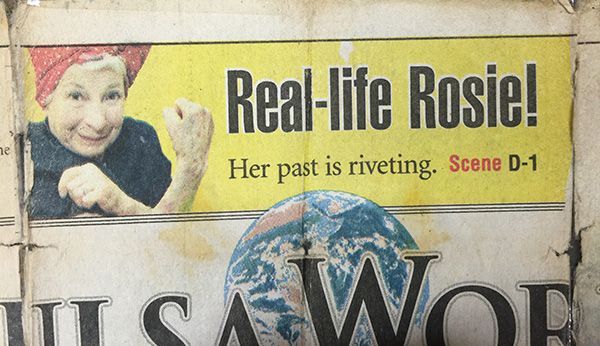PASS Member Meets One of the Last Remaining Original “Rosie the Riveters”
- Details
- Published: April 14, 2016

While receiving her own awards and recognition at the Tulsa Veterans Day Parade, Chapter OK3 member and Region II member of the National PR Committee Beverly “BJ” Chinnery had the honor of meeting another American veteran, Marina Metevelis. The Wichita native and long-time historian at Tulsa Community College (TCC), Matevelis, now age 94, is one of three original remaining “Rosie the Riveters.”
After getting acquainted at the parade, Chinnery was fortunate enough to schedule a future Q&A with Metevelis, whose time you can imagine is quite valuable. Joined by PASS Region II Vice President Dave Spero, the group had the opportunity to chat with Metevelis as she reflected on various struggles and accomplishments during her lifetime. “I thought I had a lot of stories,” joked Chinnery. “After speaking with Marina, I was amazed by her knowledge of U.S. history and everything that she has been through. Her past of overcoming adversity and all of her perseverance shines right through her. It was truly an unforgettable and eye-opening experience speaking with her.”
The Q&A itself consisted of questions that garnered responses ranging from Metevelis’ work at Boeing in the 1940s as a “blister inspector” to working and teaching at TCC (then known at Tulsa Junior College) for over 45 years. When asked about her typical “day in the life” as a Rosie, Metevelis responded with a grin on her face. “My days in high school started at 6:00 a.m.,” she began. “By 8:30 a.m., I arrived at school and stayed until 2:30 p.m. each day. Afterwards, I would change into my coveralls and carpool to Boeing, where I usually worked until midnight.”
She continued, “I learned to do men’s work. I went to rivet school for six weeks to get my certificate as a riveter and was made the ‘blister inspector’ on my shift.” Metevelis routinely worked on B-17s, meticulously examining “blisters,” which refer to the site where gunners would sit in the aircrafts, and would point out any areas where modifications were needed. “I had to make sure every rivet on the ‘blister’ was correctly positioned. We proved we could do men’s work with the training we were given. It was serious business. We had a job, good pay and worked for our country.”
The veteran, who no longer has fingerprints on her right index finger and thumb from practicing her craft, also addressed what she considers to be her proudest achievements in life. “My work in the aviation plants. My contribution as a Red Cross nurse’s aide,” she recalled. “Keeping up my education by taking correspondence courses from the nearest university so I could follow my husband from army camps and army hospitals when he was brought back from the D-Day invasion.”
Toward the end of their conversation, Chinnery asked Metevelis about her thoughts on privatizing the nation’s air traffic control system. Matevelis simply replied, “Why take something away from people who know what they are doing and give it to someone else who doesn’t?” After their initial meeting, Chinnery and Metevelis have bonded to the extent where they now meet regularly to share stories with one another and have friendly discussions about whatever is on their minds. PASS thanks Matevelis and all those who worked alongside her to build our country.

Pictured:
Marina Metevelis and BJ Chinnery with some PASS gear.
A clip from a local paper featuring a story on "Rosie."




